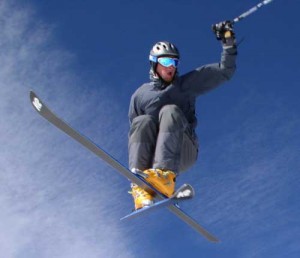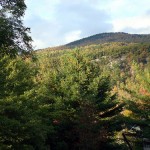How Apps Are Keeping Ski Areas Honest
Spring weather is now starting to roll in, but just last week winter had its last hurrah. And when those big snow storms wallop the mountains, ski areas see dollar signs.
A pair of Dartmouth economists are researching the tendency of ski areas to exaggerate snowfall reports, especially on weekends, in hopes of luring more skiers to the slopes. But they found that interactive websites and smartphone apps are turning those ski areas into honest brokers.
Relying on the ski area for information about trail conditions is a bit like relying on the owner of a theater to review movies that he’s playing. In both instances there’s a pretty good incentive to make them sound a lot better than they are.
Nevertheless that’s the information skiers have been relying on for a long time.
Greg Keeler, the head of marketing at Cannon Mountain, says Cannon is very honest in reporting snowfall totals. “We make a point of just trying to call it the way it lands, so that’s just kinda the way we do it here,” Keeler says.
He says that the ski areas that he has worked at have always played it straight. He says there is a definite procedure for how snowfall is measured.
“Snow reporters go out and measure the snow. We have certain spots around the base where we check to get few different measurements and readings,” he says, “and then we check in with groomers and ski patrollers in the morning to see if there’s any major difference between the summit and the base.”
But despite Keeler’s assurances, many people have a hard time trusting the ski areas’ self-reviewing.
Take Jon Zinman for example. He’s an economist at Dartmouth College. Zinman and his coauthor, Eric Zitzwitz, have been thinking about the profit motive ski areas’ have to exaggerate for a long time. They hatched the idea for a research paper while sitting on a chair-lift one day.
Zinman says, “There’s lots of, I guess you could call it ‘anec-data’ out there: everybody has a story pro or con.” But he and his colleague set about hunting down raw data to prove that ski areas inflate their snowfall numbers.
They discovered that – surprise, surprise – the marketers were exaggerating.
“Ski resorts tend to report more snow on weekends than on weekdays,” Zinman says, “some ski resorts tend to exaggerate more on weekends than others, namely those that have expert terrain and don’t offer money back guarantees.”
But just as they made these findings, the world of snow reporting was changing.
“An iPhone app launched that made it much easier for skiers to report on resort reports in real-time, using their phones say from the lift or from the lodge,” Zinman recounts. Almost immediately the instance of weekend exaggeration fell off a cliff.
So Zinman says that, now-a-days, Greg Keeler from Cannon Mountain probably is reporting snowfall as accurately as he can.
Not that Keeler is really nervous that ski areas have lost their monopoly on reporting skiing conditions. He thinks it’s great that skiers are reporting in from the chair-lifts, though he says Cannon mostly sees this effect on Facebook.
“We just say, here’s the story, it snowed six inches today, it was awesome, here’s a picture. And then everybody kinda lines up and says, ‘Yeah it was,’ or you know once in a while somebody will say, ‘Yeah it was good but maybe over here it wasn’t that great,’ and it’s all good and we let the conversation happen,” Keeler says.
Zinman thinks that resorts probably gave up inflating their numbers so quickly because, quite simply, it wasn’t getting more skiers to turn out.
“Even before the iPhone App, skiers were pretty savvy about this exaggeration, and had pierced the veil to a great extent.”
In other words, everyone already knew that you can’t trust the theater to review the movies, you’ve either got to see them for yourself, or ask a friend.



